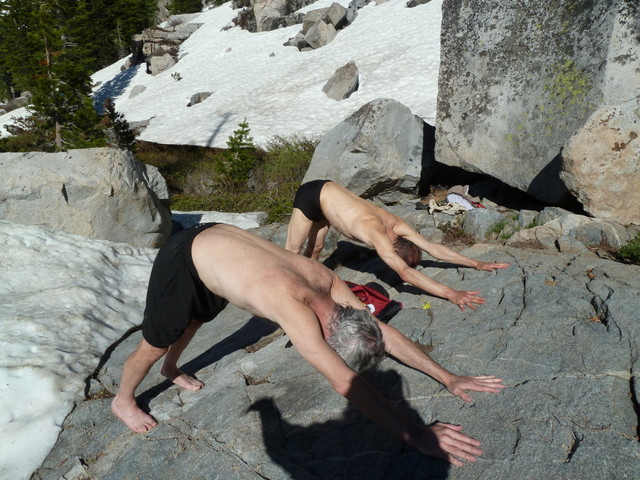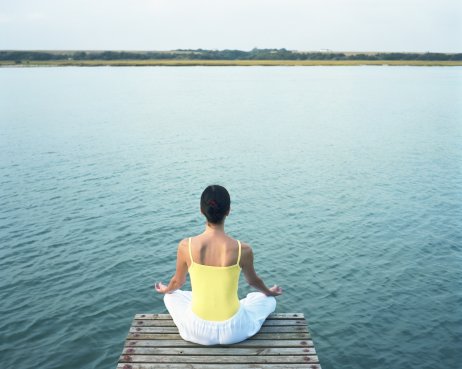If you are having trouble viewing this e-mail, click here for web version.
 |
Vrtti August 2013 - Yoga and The Great Outdoors |
 |
Dear Yoga Friends, Like most of you, I love getting outside. The mountains, the beach, the urban landscape, my neighborhood. So you might be expecting suggestions about doing yoga on rocks, at the beach, in beautiful natural settings. Not that I or any of you haven't played with this. It's fun. Try an unsupported handstand on the beach; it won't hurt if you fall in soft sand. Do dog pose on a big flat rock. Kick a leg up in the a notch of a tree, or the tailgate, hood, or roof of a car. Fun ways to stretch. But when we get to the point where you are sitting on a rock, gazing into a beautiful landscape, all blissed-out, and calling it yoga, that's when a yellow flag needs to go up. Patanjali makes it quite clear that yoga is not about pleasing the senses, or more accurately, allowing our mind to continue to seek sensual pleasures. And much of our outdoor activity centers around that: beautiful sunsets, lakes, mountain scenery, fresh air, cool water, flowers, the night sky, etc. The full experience of these things is so important and transforming, but we need to proceed with caution. A yoga practitioner once told me she loved yoga because it feels so good. I wondered what kind of yoga she was practicing. Why didn't she share my sensation of wanting so badly to get out of some of the asanas I put myself into, the struggle of bringing my mind to a place where I can stay in and work with an asana and not pop out and look for something else? So when you are doing dog pose on that grassy meadow in the warm sun, ask yourself how much of this is about going after a pleasing sensation, a familiar soothing stretch under ideal conditions. This is not a bad thing, in fact it could be just the ticket in that moment. Not to throw a wet blanket on things, but I don't believe that's really yoga. Here are a few things B.K.S. Iyengar has to say about the time and place for asana practice (from the section Hints and Cautions for the Practice of Asanas in Light on Yoga:
When he writes "bare floor" here, he means dirt, not the smooth and level wood or tile floors that we think of as bare. So a blanket, mat, or some kind of flooring is needed. The implication here is that you need to go back to that sheltered room with an even floor, a place that allows you to stabilize and go inside, without the distraction of pleasing external sensations like the warmth of the rock, the wind in the trees, the salt air. In other words, you can't seek yoga, union, and bhoga, pleasure, at the same time. Gazing at a magnificent vista can fool you into feeling connected to nature when in reality you might just be experiencing some pleasing sensations that happen to emanate from nature. B.K.S. Iyengar makes this point succinctly in his recent book Core of the Yoga Sutras:
What does Patanjali have to say? Here's Sutra II.18 (translation from B.K.S. Iyengar's Light on the Yoga Sutras of Patanjali):
Ok, I'm far from a sutras scholar, but clearly Patanjali is pointing out a major fork in the road. Our mind's experience of nature can lead us to the enjoyment of the senses, or to a sense of freedom that comes from yoga. Do I enjoy that hike in the mountains? Of course. Is it yoga? Maybe. It depends whether we are dwelling on making things as pleasing or satisfying as possible, or continuing down a path of discovery of who or what we really are. Intense natural beauty can get us started by instilling awe and making us forget our small selves. But the next steps are easier for me in a simple, neutral surrounding, away from those sunsets and mirror-like mountain lakes that fill up my senses and give me such intense pleasure. And finally, I need to remind myself how lucky I am, given the magnitude of suffering in the world, all those minds preoccupied with survival or just making ends meet, to have at this moment the opportunity to explore this special kind of practice and inquiry. Interested in your perspectives as always. Namaste, Chad |
|

